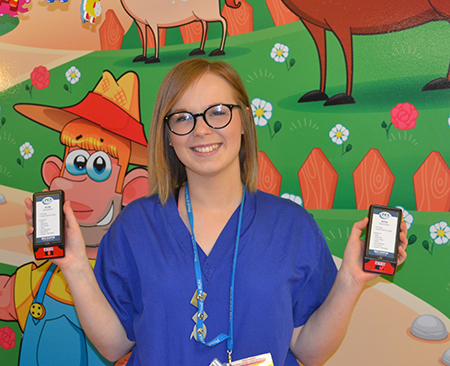Media Release
Date: 30 April 2019
Parent pagers helping young patients
Anxious parents waiting while their child has surgery at the Royal United Hospitals Bath NHS Foundation Trust (RUH) are now being given pagers to alert them when all is well.
What began as a trial in the Recovery Unit has proved so successful that it's now being extended to other areas across the hospital.
Instead of being contacted by their mobile phone, parents are now given a pager which bleeps to let them know when their child is waking up.

Heather White - Staff Nurse in Recovery with two of the parent pagers
Consultant anaesthetist Fiona Kelly, who helped set up the initiative, said: "Mobile phones aren't always reliable – some parents have their phone turned off or turned down, and some might not have a mobile. We've shown that a personal pager is a much more reliable way of contacting them when they're needed.
"A pager gives parents or carers a sense of reassurance and lets them have a break, for example to leave the ward and go to the hospital café, while their child is having their operation. Parents often do not eat and drink on the morning of surgery while their child is nil by mouth, and this can make a difficult day for them even harder. The pagers also guarantee that parents can be easily called when they're needed, meaning they can be quickly reunited with their child in recovery. This gives the parents a greater sense of control."
Some 3000 children from two months to 18 years old are anaesthetised each year at the RUH. A 2017 survey showed that, before the pager system was introduced, it took an average of 23 minutes for a parent to re-join their child in the Recovery Unit, and 70% of children waited for more than 15 minutes. Using the pagers has cut that time to an average 2.8 minutes, with no child waiting more than 11 minutes.
Fiona Kelly said: "The feedback has been really positive, with parents saying how big a benefit the pagers are, improving their child's experience and making it much less stressful for them."
Kerry and Neil Sidwick were given a parent pager when their son Charlie had an operation to have four teeth removed. Kelly said: "The pager gave us reassurance that we would not miss Charlie waking up. It meant we could pop and get a coffee without risking not being there for him."
Kerry and Neil Sidwick with son Charlie
The pagers were funded by the Friends of the RUH charity and the Trust's Innovation Panel, where staff pitch for funding for ideas that improve patient care and experience and efficiency.
Identical pagers have been successfully introduced in the Intensive Care Unit for family and friends of patients, and it is now hoped to roll out pagers in pharmacy and in other wards and hospital areas.
The pager programme is supported by the Trust's Patient Experience Team. Lead Sharon Manhi said: "As a Trust, we are committed to ensuring that we use the experience of our patients, families and staff to improve the care that we provide. Introducing these pagers is a brilliant example of a simple idea that we can demonstrate has real benefits to all concerned."
ENDS
Notes to Editor
- The Royal United Hospitals Bath NHS Foundation Trust provides acute treatment and care for a catchment population of around 500,000 people in Bath, and the surrounding towns and villages in North East Somerset and Western Wiltshire. The hospital provides healthcare to the population served by four Clinical Commissioning Groups: Bath & North East Somerset CCG, Wiltshire CCG, Somerset CCG and South Gloucestershire CCG.
- The Trust has 759 beds and a comprehensive range of acute services including medicine and surgery, services for women and children, accident and emergency services, and diagnostic and clinical support services.
- In 2015 The Royal United Hospitals NHS Foundation Trust acquired the Royal National Hospital for Rheumatic Diseases (RNHRD) NHS Foundation Trust. The RNHRD treats patients from across the country offering services in rheumatology, chronic pain, chronic fatigue syndrome/ME, cancer related fatigue and fatigue linked to other long term conditions such as multiple sclerosis.
- The RUH is changing - we have an exciting programme of redevelopment underway transforming our site and further improving the services we provide. The Trust is building a purpose built RNHRD and Therapies Centre and is now working towards a new Dyson Cancer Centre. For more details visit: www.ruh.nhs.uk/fit4future

